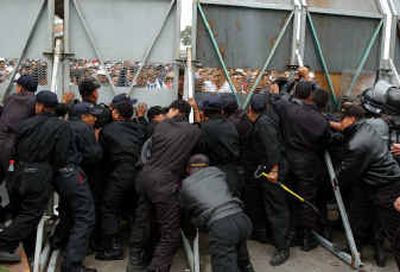Mexican chief’s speech met with protests, strike

MEXICO CITY – President Vicente Fox defended his government’s democratic gains Wednesday in his fourth state of the union address, but thousands of protesters staged a one-day strike and nearly paralyzed this metropolis, symptomatic of public anger over rising crime, corruption and poverty.
“When I became president of Mexico, I included society’s democratic aspirations in my government’s projects,” Fox said, according to an advance copy of the speech. “The mandate citizens gave me was clear: to advance building a government guided by the independence of government branches and the strengthening of the legal order.”
Fox won office in 2000 as the first president in more than 70 years not to belong to the Institutional Revolutionary Party, and many hailed him as Mexico’s first democratically elected president.
Since then, his reform efforts have been met with a growing sense of dissatisfaction. Tens of thousands of demonstrators brought this capital of 20 million nearly to a halt Wednesday.
It was the largest protest aimed at a state of the union address in recent memory.
Electrical and telephone union members, farming organizations, students and human rights groups began moving toward Congress at noon, blocking major intersections and jamming traffic.
More than 7,000 police officers and presidential guards blocked the protesters from reaching Congress. Barricades stretched for three miles, closing off 300 city blocks.
Demonstrators threw garbage and eggs and set off firecrackers. They carried banners reading, “Liar,” “Enough!” and “You fooled us!”
Radio and television reports urged people to stay at home. Several subway stations were closed, and government day-care centers were shut down.
The demonstrators were led by workers from the vast Mexican Social Security Institute, which provides government-paid health care, protesting a change in pension rules to require workers to pay into the pension system. Union leaders see the change as part of a larger plan to privatize pensions and renegotiate labor contracts at state-owned enterprises.
Fox has said the changes are necessary because the pension program was consuming too much money meant for medical care. He defended the move in his address Wednesday.
“This is the first step in guaranteeing the financial viability and raising the quality of its services,” the president said.
In other issues, Fox:
• Promised to double the budget for fighting crime by 2005.
• Promised that his government will push federal courts to hear cases involving political crimes committed during Mexico’s dirty war 30 years ago.
• Defended his opposition to the U.S.-led war in Iraq, saying it “proves we are a nation firmly committed to peace and multilateralism.”
“Today our political life is more open, more plural and intense than ever,” he said. “Democracy is not the absence of conflict; it is the freedom to debate problems.”
But democracy has taken its toll on Fox two years before he leaves office.
With the Institutional Revolutionary Party, known by its Spanish initials as the PRI, still controlling Congress and the loyalty of unions whose membership includes millions of federal and state workers, Fox’s hopes for major electoral, fiscal and social development revisions have been blocked.
“Nobody is happy. The PRI used to give us uniforms for our jobs and now we have to buy everything. I’m voting for the PRI in 2006,” said Alfonso Hernandez, 32, who cleans the city’s sewage system.
In a poll published Wednesday by the daily newspaper Reforma, Mexicans gave Fox a 54 percent approval rating, while 36 percent rebuffed him. The Mexico City El Universal, meanwhile, published a survey showing 58 percent approved of Fox’s performance while 39 disapproved.
Both numbers are down from the 70 percent rating he had when he took office.